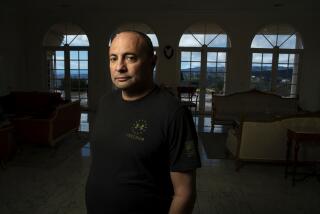Producer gets short sentence in TV scam
- Share via
In a ruling that surprised attorneys and outraged investors, a federal judge Monday sentenced onetime Hollywood producer Joseph Medawar to a year and a day in prison for swindling scores of people out of millions of dollars to develop a bogus television show about the U.S. Department of Homeland Security.
Minutes after Medawar apologized to the people he defrauded, U.S. District Judge Manuel L. Real sentenced the 45-year-old con man to a prison term far shorter than the 33 months his attorney had requested, or the 57 months sought by the government. Medawar also was sentenced to nine months’ home detention after his prison sentence ends and 3,000 hours of community service, and he was ordered to pay at least $2.6 million in restitution.
Showing no emotion, Medawar left the courtroom without comment. He was ordered to surrender Jan. 22 to begin his prison term. His attorney, Jeffrey Rutherford, later issued a prepared statement.
“Joseph Medawar accepts his sentence,” the statement read. “He is extremely remorseful and repentant. He is sorry for the harm that he has caused and he accepts full responsibility for his conduct. He thanks his family and friends for their support. He vows to repay each of the victim-investors. He also vows to continue to help the government in its investigation of others.”
Acknowledging disappointment, Assistant U.S. Atty. Christine Ewell told reporters outside court that authorities would review Real’s sentence to see if there are any grounds for appeal.
Ewell also was apologetic when questioned by many investors about whether and when they might get reimbursed.
“We’re doing our best. We’re sorry,” she told one woman. “Our goal is to get as much as we can back to you.”
Real, 82, has been a lightning rod for criticism, with a reputation for a peremptory and even cantankerous temperament on the bench. Most recently, he was the subject of a congressional subcommittee hearing considering possible impeachment over his decision to seize a bankruptcy case from another judge.
After the sentence, investor Manuel Lozano did not hide his disappointment.
“I was looking for justice,” he said. “I was expecting more.”
In May, about three years after he first began promoting his idea for a Homeland Security series, Medawar admitted to authorities that the show was a financial scam and pleaded guilty to conspiracy to commit mail fraud and income tax evasion.
By then, according to the FBI, the IRS and the U.S. attorney’s office, Medawar and others had defrauded at least 70 investors -- many from local churches -- out of millions of dollars.
The money poured into his company, Steeple Productions, was spent on luxury cars, shopping sprees, jewelry, posh dinners and $40,000-a-month rent on a Beverly Hills mansion for the show’s purported lead actress, Alison Heruth-Waterbury.
Heruth-Waterbury previously pleaded guilty in the case and was sentenced to five years’ probation and 2,500 hours of community service and ordered to pay restitution. Jeffrey Rosenberg, former chief financial officer of Medawar’s company, was sentenced to 10 months in federal prison for lying to agents about the fraud.
Medawar also persuaded two prominent Orange County Republicans, U.S. Rep. Dana Rohrabacher and former congressman and current Securities and Exchange Commission Chairman Christopher Cox, as well as House Homeland Security Committee staffers, to provide advice on how to make the show more realistic.
Medawar also was accused of using money laundered through the scheme to pay Rohrabacher (R-Huntington Beach) $23,000 for an option on a 30-year-old screenplay by Rohrabacher. The congressman has said he thought Medawar’s proposed TV show would bring positive attention to the nation’s homeland security efforts and denied that he provided Medawar any special attention in return for the producer’s purchasing Rohrabacher’s script or contributing to his political campaign.
In May, when Medawar pleaded guilty, Rohrabacher said he would return the screenplay option payment.
At Monday’s hearing, the courtroom was packed with Medawar’s relatives and victims.
Carmen Wood, 71, of Southgate, who invested $10,000 from her family trust, talked about how she blindly put her faith in Medawar and his idea the day she met him at a Whittier church, and how disappointed she was that someone would misuse Christianity to target innocent people for financial gain.
“I am asking that justice be served here for me and these people here who lost money,” she said, later turning to look straight at Medawar and saying. “May God be your judge.”
Lozano, who lost $120,000, told the story of another investor who could not be in court Tuesday. The man, suffering from lung cancer, had scraped up $1,000 to give Medawar, banking on the hope that once the production company went public, as promised, it would bring the payday he needed for a special medical procedure that could have saved his life. “His illness got the best of him,” Lozano said of the man, who died “waiting for the money.”
Minutes before Real’s ruling, prosecutor Ewell urged the judge to sentence Medawar to no less than the nearly six years recommended by the government. She also dismissed the arguments of Medawar’s family and friends that he is a good man who has always been generous to them.
“It’s simple to be generous,” Ewell scoffed, “when you are using other people’s money.”
*
More to Read
Inside the business of entertainment
The Wide Shot brings you news, analysis and insights on everything from streaming wars to production — and what it all means for the future.
You may occasionally receive promotional content from the Los Angeles Times.










